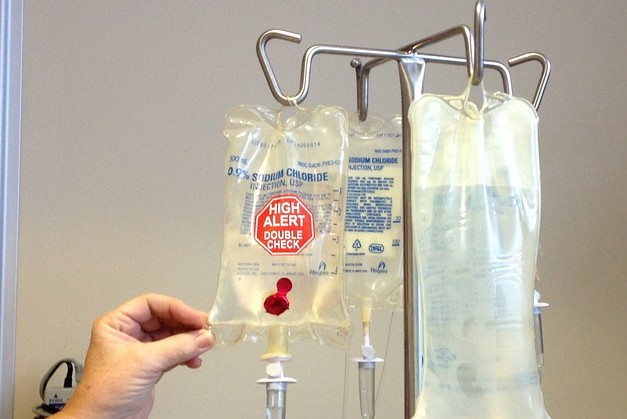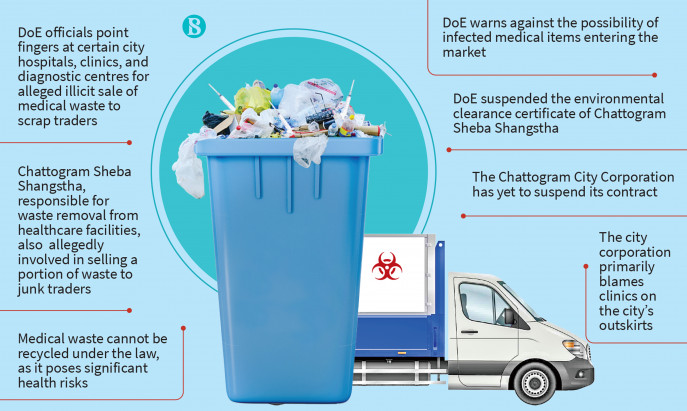Safeguarding Health: Introducing the Significance of Specialist Medical Waste Removal
Wiki Article
Keep Compliant and Safe: Just How to Dispose of Medical Waste Appropriately
In today's ever-changing medical care landscape, ensuring compliance and security when it comes to clinical waste disposal is of utmost importance. In this discussion, we will check out the numerous kinds of medical waste, the involved dangers, the lawful requirements, and the finest techniques for maintaining a compliant and risk-free clinical waste monitoring system.Importance of Appropriate Medical Garbage Disposal
Correct clinical garbage disposal is of utmost relevance in guaranteeing the security and health of both medical care workers and the general public. Medical waste, which includes items such as used needles, contaminated dressings, and expired medications, poses serious health threats otherwise managed and gotten rid of appropriately.
Moreover, incorrect disposal of clinical waste can bring about ecological contamination. When clinical waste is not segregated, treated, or disposed of correctly, it can find its method right into garbage dumps or bodies of water, possibly contaminating the water, dirt, or air sources. This can have destructive effects on environments and human health and wellness, as harmful substances may leach right into the setting or be released into the ambience.
Sorts Of Clinical Waste and Their Risks
The varied variety of medical waste generated by medical care centers offers various risks that must be thoroughly addressed to make sure appropriate disposal and avoid possible harm to public health and wellness and the atmosphere. Clinical waste can be classified right into different categories based on its characteristics and degree of danger.One type of clinical waste is infectious waste, that includes items that are polluted with blood or various other possibly infectious products. This can include utilized needles, syringes, and various other sharp objects, as well as cells, swabs, and dressings from patients with infectious illness. Incorrect disposal of infectious waste can cause the transmission of harmful virus and the spread of infections.
An additional group is contaminated materials, which includes materials that are harmful, combustible, harsh, or reactive. This can consist of chemicals, drugs, and certain clinical tools. Messing up or inappropriate disposal of contaminated materials can lead to environmental contamination and position dangers to the health and wellness of waste employees and the public.
Contaminated waste is an additional kind of clinical waste that should be very carefully managed. This waste includes materials that contain radioactive substances, such as used radiation treatment sources or polluted research laboratory products. Improper handling or disposal of radioactive waste can bring about radiation direct exposure and severe wellness threats.
Last but not least, non-hazardous basic waste, such as paper, product packaging materials, and food waste, is likewise generated by health care facilities. While this waste might not pose substantial threats, it still needs to be properly handled to keep sanitation and stop the attraction of parasites.
To ensure the risk-free disposal of medical waste, healthcare facilities must apply correct segregation, treatment, storage space, and transportation methods. This consists of utilizing proper containers, labeling, and training for team, in addition to abiding with neighborhood guidelines and standards. By dealing with the dangers connected with various kinds of medical waste, health care facilities can secure public health and wellness and the atmosphere.
Regulatory and lawful Requirements for Disposal
In order to make sure the correct and safe disposal of clinical waste, medical care facilities must follow legal and regulatory requirements. These requirements are in place to protect public health and the environment from the prospective risks connected with medical waste. Clinical waste is categorized as a special group of waste due to its prospective to transfer contagious conditions and consist of unsafe substances.
Some typical needs consist of the segregation and proper packaging of medical waste, using accepted containers and labels, and the application of risk-free handling and transport treatments - medical waste removal services. Healthcare centers might likewise be called for to preserve documents of their waste management methods and offer documents to governing authorities upon request
Failure to abide by these regulatory and lawful requirements can result in charges, fines, and reputational damages for health care centers. It is, therefore, necessary for doctor to prioritize conformity and establish durable waste monitoring procedures to make sure the safe and appropriate disposal of medical waste.
Ideal Practices for Safe Medical Waste Administration
Healthcare centers must abide by industry ideal techniques to make certain the reliable and risk-free management of medical waste - medical waste disposal services with WasteX. Applying these best methods not just aids shield the setting and public health and wellness page but additionally decreases the danger of prospective lawful and financial repercussionsAmong the vital best practices is the appropriate partition and containment of different kinds of clinical waste. This includes utilizing color-coded containers and plainly identifying them to ensure that each kind of waste is gotten rid of properly. Additionally, medical care facilities ought to have assigned locations for storage and disposal of clinical waste, with clear guidelines and treatments in area.
One more important element of safe clinical waste administration is the training and education and learning of healthcare personnel. All personnel who handle clinical waste should get detailed training on the proper handling, storage, and disposal procedures. It is essential to guarantee that employee know the potential threats associated with clinical waste and are furnished with the essential understanding and abilities to handle it securely.
Regular tracking and bookkeeping of waste administration practices is additionally essential. This includes regularly assessing waste administration treatments, performing assessments, and keeping exact documents. By checking waste monitoring practices, healthcare centers can recognize any type of potential issues or locations for enhancement and take corrective activities accordingly.
Finally, medical care centers need to prioritize the use of eco-friendly disposal techniques whenever possible. This includes making use of waste therapy innovations such as autoclaving or incineration, which can help in reducing the volume and unsafe nature of clinical waste.
Eco-Friendly Solutions for Medical Waste Disposal
Implementing green solutions for clinical garbage disposal is vital for healthcare centers to minimize environmental effect and guarantee sustainable methods. Typical approaches of clinical waste disposal, such as incineration and landfilling, have been located to launch unsafe pollutants right into the air and pollute soil and water sources. Because of this, there is an expanding need for different techniques that are both environmentally friendly and risk-free.These systems utilize sophisticated technologies to securely process medical waste within the health care facility itself. By dealing with the waste on-site, transport discharges and risks linked with off-site disposal are minimized.
One more green technique is the adoption of reusing programs for certain sorts of medical waste. Products such as glass, plastics, and metals can be recycled instead of disposed of in land fills. By executing segregation and reusing programs, medical care centers can significantly reduce their waste quantity and decrease their ecological footprint.
In addition, medical care centers can check out the usage of reusable clinical equipment and products. By going with recyclable products, instead of single-use alternatives, the amount of waste created is substantially reduced. Reusable products can be disinfected and used numerous times, causing price savings and less ecological effect.
Verdict
In verdict, correct disposal of clinical waste is important for maintaining conformity and making sure safety. Adhering to finest techniques for safe clinical waste administration and exploring green remedies can contribute to a sustainable and responsible approach to lose disposal in the healthcare market.
In directory this discussion, we right here will explore the various kinds of clinical waste, the involved dangers, the legal demands, and the ideal techniques for preserving a certified and risk-free medical waste management system - medical waste removal near me.One kind of clinical waste is transmittable waste, which consists of items that are polluted with blood or other possibly transmittable materials.Radioactive waste is another kind of clinical waste that need to be carefully managed. Medical waste is categorized as a special group of waste due to its prospective to transfer contagious diseases and consist of dangerous materials
Complying with best practices for safe clinical waste administration and checking out green solutions can add to a sustainable and liable method to lose disposal in the healthcare industry. medical waste disposal services with WasteX.
Report this wiki page